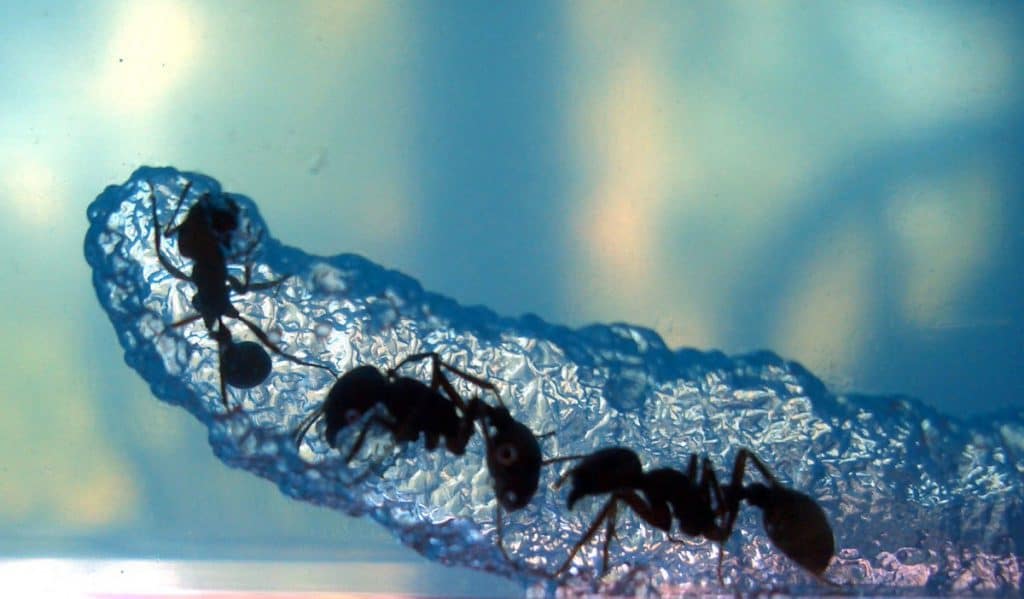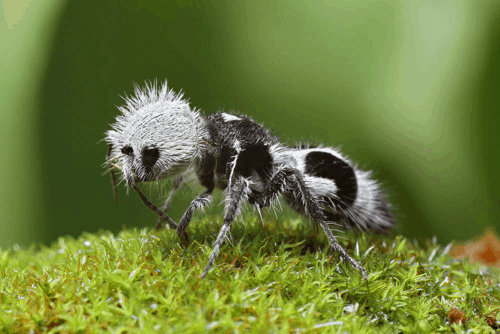
If you enjoy reading this article, why not check out our articles on Everything You Need to Know About Ants in Your Walls and Tiny Ants in the Bathroom? The EASY Way to Get Rid of Them
Ever popular with children, an ant farm is a small glass case filled with sand or a transparent substance in which ants can be witnessed going about their daily lives. Whether you’re thinking of getting one for a child or for yourself, for education, for fun or even just for the company, there’s a couple of things that you need to consider first.
Although ant farms can provide countless hours of entertainment and really awaken young minds to the wonders of the natural world, some would consider them unsafe, and unethical. In this article, we’ll be discussing some of the pros and cons of keeping an ant farm and giving you the low down on everything you need to know about this niche hobby.
Are Ant Farms A Bad Idea?
When people ask whether ant farms are a bad idea, they are usually concerned about the safety of the children playing with the ants, and of the household at large. The easy answer to that question is that ant farms are generally safe. The biggest fear is that a child will knock an ant farm over, releasing those tiny creatures in the whole house. While this is a real possibility, the consequences of that action would still be manageable, and most children can be trusted to take great caution around their farm. In fact, giving children an ant farm can make them more responsible, giving them a sense of purpose in looking after their own pet.
This will also make them a lot less likely to accidentally knock the “toy” over. A longer answer to the question, is ant farms a bad idea? involves some animal ethics and may depend on your own ideas about the place of animals in the home. In general, though, ant farms are big enough for ants to live comfortably, and the only real issue you may have is with the idea of keeping an animal for entertainment purposes only. Now let’s have a look at some popular questions on ant farms that can also help you decide whether ant farms are a good idea for you:
How Long Do Ant Farms Last?
Ants are a short-term pet. In general, you can expect them to live for up to three months after purchasing the ant farm, but not much longer. That being said, some people find that they fall in love with the idea of keeping ants, and will repurchase sand or special gel as well as ants to refill their ant farm when the last colony has died. This is a good option, especially if you get a good quality ant farm with solid clear casing.
Do Ants Suffer From Being In A Farm?
Short answer: we don’t know. There may be some psychological damage caused to the ant because of captivity, but there is no real way to tell. However, it is certain that ants get sufficient airflow when in the farm, which means their actual physical suffering should be relatively minimal. Provided that they also get the proper amount of food and water, they really shouldn’t be lacking anything in a farm that they could get in the wild.
Do The Ants Know That They Are In A Farm?
Do ants have consciousness? Well, until we are able to get in the mind of an ant, we will be stuck for answers on that particular question. But if you are wondering whether ants can tell the difference between being in a farm and being out in nature, the answer is likely no. At any rate, they behave the same way that they would in the wild, digging the same tunnels, interacting with one another in the same way, eating and drinking how they usually would. This is great news because it also means that observing ants in a farm gives you a real sense of how ants act and live their lives in the ground or in an anthill.
What Species Of Ants Should Be Put In A Farm?

Most ant species can do well in an ant farm, but some are certainly easier to take care of than others. Although it can be tempting to capture ants in the wild and introduce them to your ant farm, there are a couple of issues with that technique. First of all, if you accidentally capture a queen ant, the colony will reproduce rapidly, possibly becoming unmanageable in the farm. Secondly, you also risk bringing unwanted bacteria or fungus into the farm which could harm the ants and prevent them from living as long as they should. We recommend that you purchase an ant farm that already comes with ants. Those are usually red harvester ants, a popular species which lives long does well in smaller places and doesn’t pose a threat to the household if they get out.
How To Care For Ants In A Farm?
When you purchase an ant farm, it will generally come with very specific instructions detailing how best to care for your ants. There are two main categories of ant farms: those filled with gel, and those filled with sand. The ones that use sand require a bit more work, as you will need to give some water and food to the ants a couple of times a week. Gel ant farms are essentially self-sufficient, and you won’t have to take any special care of the colony. In general, ants are not “pets” per se, and an ant farm is a scientific experiment with a didactic goal, rather than a live organism which you have to take active care of. We have a whole article discussing gel vs. sand ant farms, check it out: Ant Farms Gel vs Sand, Which is Best?
Will Ants Reproduce In The Ant Farm
Don’t let the word “farm” fool you, this kind of game isn’t actually for “growing” ants. The ants that you get when you buy the farm will not reproduce, and once they have died you will have to purchase a new colony if you want to keep the farm going. This is because governmental regulations generally make it impossible for ant farm manufacturers to sell you a queen ant. And queen ants are the only ants capable of laying eggs and having children. In their absence, your farm will be filled with worker ants only, who will not be able to reproduce.
What Can Ant Farms Teach Children?

The greatest thing about ant farms is definitely their educational potential. For children (and for the adults who love them too), ant farms can open eyes on the wonders of the natural world, give them a sense of purpose, and provide a healthy alternative to video games. First of all, ants are very smart animals who have elaborate strategies involved in digging tunnels and organizing to get food. This is interesting and a great example of effective community living. Secondly, keeping ants can teach children to be more responsible. They will know that it is their responsibility to make sure ants are not exposed to too much sun, that they have enough water and food, and that their habitat is not being shaken. This is a great first step: an introduction to responsibility and caring about others that is a lot more achievable than looking after, say, a puppy or kitten.
What If My Ants Get Out?
One of the main problems with getting an ant farm is that the receptacle risks being knocked over, resulting in dozens of ants being released into your living space. In most cases, the infestation can be contained if you realize that the ants have escaped in due time, and are able to pick them up to release them into nature. In some rare cases, however, you would risk an ant infestation. This is especially likely if you have a much larger farm with a big colony. You can then decide to take care of them yourself, or get professional help. A professional will know exactly what to do, but will cost a lot more money. If you decide to get rid of the ants yourself, you will need to buy special products such as Orange Guard. These are non-toxic and can be used to chase ants away from your house without causing them any harm. A definite advantage if you consider you or your child will likely have got attached to those little pets! If you do happen to find your house flooded with ants from an ant farm that got knocked over, our article What Can Ants Bite and Chew Through? has some great instructions for dealing with the stray ants.
Getting an ant farm can be a scary prospect if you are afraid of insects, or if you are worried about them getting out. However, keeping ants does remain a safe hobby, and the biggest risk that you’ll encounter, which is an ant infestation, can be prevented or countered easily enough. This means that your biggest consideration in deciding whether to get an ant farm will be ethical. Do you think animals should be used for entertainment? Is it fair to keep a pet that only lives a couple of months? Am I ready to take proper care of those insects while they live? Those are the questions which you will have to ask yourself. And remember, even though ant farms are usually presented as a fun science experiment for children, ants remain real animals that require the proper conditions to survive, grow, and thrive!
If you enjoyed reading this article, why not check out our articles on Do Ants Hibernate in the Winter? Let’s Find Out and What Can Ants Damage? What You Didn’t Know
Recent Posts
Tiny Black Bugs in Bathroom NO WINGS: What They Are and What to Do!
Finding tiny black bugs in your bathroom can be uncomfortable, to say the least. Especially if they are persistent, or they appear in very large numbers, which they often like to do. When it...
Tiny Black Bugs in Plant Soil - What Are They & What To Do About It
A short horror story: You get a new houseplant. You do your best to take care of it. You’ve ensured that it has the right soil, the right amount of sun, it gets enough water. And then one day, you...

